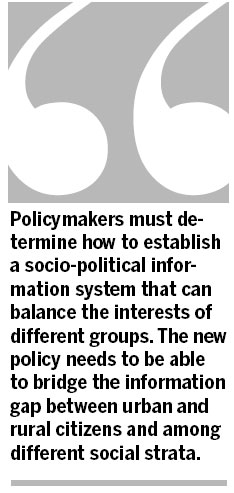Op-Ed Contributors
Three into one for benefit of all
Updated: 2011-08-03 07:52
By Hu Zhengrong & Ji Deqiang (China Daily)
Integration of telecom, cable TV and Internet networks should focus on developing the 'new countryside'
Tri-network integration, i.e., the integration of telecommunications networks, cable TV networks and the Internet, will play an important role in the transformation of China's society in the information era. The government should bear this in mind during the policymaking process.
In 1999, the State Council issued a circular forbidding the cable and telecom sectors to transgress into each other's business areas. However, since early last year, the State Council has been pushing forward tri-network integration.
With the adjustment of government policies, the cable and telecom sectors have been competing to claim more "territories" from each other.
Meanwhile, the market for the traditional broadcast operators has started shrinking, and telecom operators have had to meet the huge cost of providing 3G services. Consequently the two sectors are seeking opportunities in each other's peripheral areas, such as Internet services and the production of Internet Protocol television (IPTV) content.
But the "internal friction" between broadcast and telecom operators at home should not be an obstacle to the globalization of the Chinese information industry. So the key question is: how to adapt China's information-oriented economic development to the structural changes of the economy.

The policies relating to the integration of the three networks will not only influence China's economic development, but also its systematic and social framework.
Therefore the transition into the information era is by no means as simple as just upgrading networks, it is a complicated process that also has implications for China's growth model.
With the spread of the Internet in China, the country has become one of the most connected in the world with 485 million netizens. New network policies are sure to be introduced, as the integration of the three networks is an essential step for China to take in its digitalization process.
But a big basket of supporting measures - concerning almost every aspect of the country's information endeavor - must also be carefully considered in advance, including the construction of a national information network, the development of information technology, the cultivation of talent and the comprehensive provision of information resources.
The operators of new networks are primarily public service providers. That is to say, they should not look at their own interests only, but shoulder their responsibilities as public information service providers.
So policymakers must determine how to establish a socio-political information system that can balance the interests of different groups. The new policy needs to be able to bridge the information gap between urban and rural citizens and among different social strata and help create a better society based on fairness and justice.
Tri-network integration should avoid any tendency to favor the social elite. Instead it should cater to the needs of the general public and be a platform enabling them to participate in society.
Public service should be the core tenet for the integration of the three networks. Otherwise, the merging of the different networks will not help the needy majority and the transformation will be merely a cosmetic change rather than a fundamental development of the information industry.
Tri-network integration should act as an important driving force to balance the social and economic development in different parts of China. The cable and telecom sectors have already occupied the market in the economically developed coastal areas and first-tier cities, which has led to a widening information gap between these areas and the vast underdeveloped inland areas of China.
To this end, poverty-stricken areas of the countryside should be targeted for tri-network integration. Cable and telecom network building in the rural areas should be an important part of the development of the "new countryside".
Only when more people benefit from technology can the country be said to have entered the "information age".
Policymakers should bear this in mind when drafting new guidelines for the spread of new integrated services.
The authors are with the National Center for Radio and Television Studies of Communication University of China in Beijing.
China Forum
(China Daily 08/03/2011 page8)
E-paper

Double vision
Prosperous Hangzhou banks on creative energies to bridge traditional and modern sectors
Minding matters
A touch of glass
No longer going by the book
Specials

Carrier set for maiden voyage
China is refitting an obsolete aircraft carrier bought from Ukraine for research and training purposes.

Pulling heart strings
The 5,000-year-old guqin holds a special place for both european and Chinese music lovers

Fit to a tea
Sixth-generation member of tea family brews up new ideas to modernize a time-honored business
